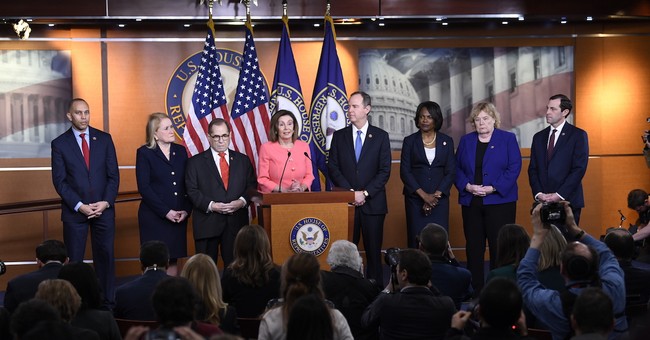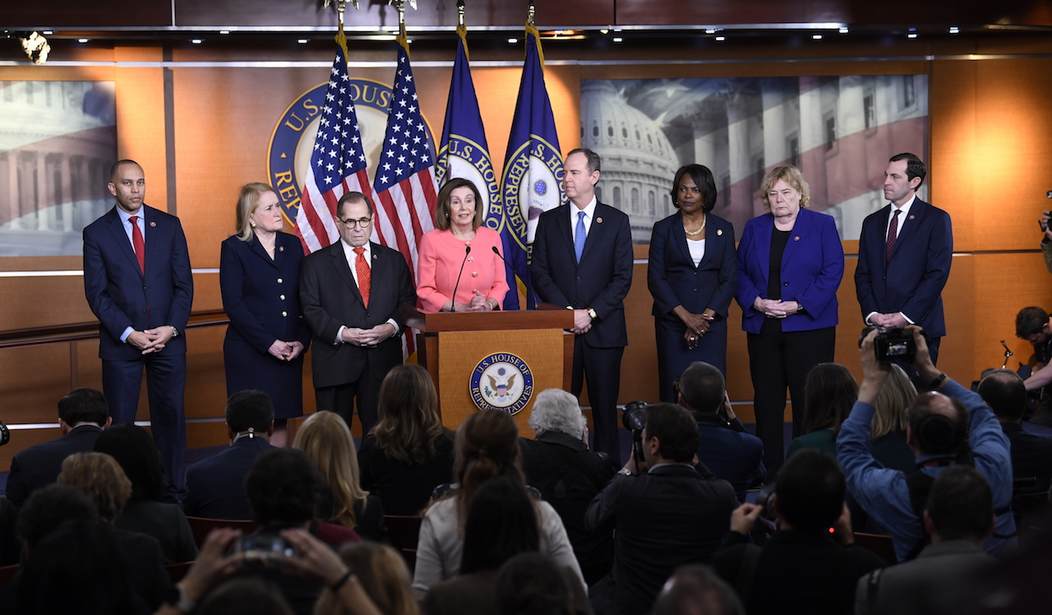
House Speaker Nancy Pelosi of Calif., speaks during a news conference to announce impeachment managers on Capitol Hill in Washington, Wednesday, Jan. 15, 2020. The U.S. House is set to vote Wednesday to send the articles of impeachment against President Donald Trump to the Senate for a landmark trial on whether the charges of abuse of power and obstruction of Congress are grounds for removal. (AP Photo/Susan Walsh)
Never letting a crisis go to waste seems to be the motto Democrats live by.
The latest example comes in regards to the current negotiations over the next phase of relief in dealing with the Wuhan virus. With the initial round of spending passed, the next phase is too include checks to Americans and loans to businesses in order to get them through this hard time. For the most part, there’s been bi-partisan buy-in that this must be done.
But some Democrats are looking to push their unrelated policy goals into the process.
Democrats on both sides of Capitol Hill are pushing to add #climate change provisions to the third aid package for people and industries affected by the novel coronavirus pandemic. @EENewsUpdates https://t.co/63br7ufU8M
— Daily Climate (@TheDailyClimate) March 20, 2020
Democrats on both sides of Capitol Hill are pushing to add climate change provisions to the third aid package for people and industries affected by the novel coronavirus pandemic.
But it’s unclear whether they have the political leverage to make those ideas stick — at least not yet.
The Democratic proposals touch on two main areas.
Several Senate Democrats want airlines to reduce their carbon emissions in exchange for federal aid that could hit $50 billion or more.
House Democrats, meanwhile, are looking at clean-tech tax credits. Those include incentives for electric vehicles, battery storage, offshore wind and solar energy that were left out of a December tax extenders package.
In a vacuum, these might not be that big of a deal. But when you understand the dynamics at play, they become much more consequential. For example, you can’t just impose arbitrary carbon emission reductions on an airline industry that’s already floundering. Further, development of aircraft that burn less fuel is already well underway, with some being delivered already (the Boeing 787 is much more efficient than a 767, for example). Airlines and aircraft manufacturers have every incentive to fly planes that burn the least amount of fuel as possible, while still getting the job done of course. Government mandates on emissions could squash a vital sector of our economy.
Businesses are hurting right now. Putting any additional pressure on the economy is absolutely nuts. We need less regulation and more freedom of movement within our economic environment right now, not more crushing government intervention.
The latter push for “clean-tech” tax credits is perhaps even worse. We are already cash strapped as a nation. Any taxpayer money spent needs to go to businesses that have actually proven to be sustainable, from the mom and pop deli to the major suppliers that keep our country going. The last thing the U.S. needs to be spending on is more Solyndra-type boondoggles, where “green” start-ups take taxpayer money and promptly blow it.
The good news is that it does not appear the Democrats pushing this stuff have much support. I expect Nancy Pelosi to push them aside, as even she recognizing the urgency of getting the next relief bill passed.














Join the conversation as a VIP Member